|
牧游社 牧有汉化翻译
Imperator - Development Diary - 4th of March 2019 Trin Tragula, Imperator
Hello and welcome to another development Diary about Imperator:Rome! 大家吼啊,欢迎阅读我们新一期帝皇:罗马的开发日志!
Today I will be talking about some changes we have done to the alliance system since it was last described in a developer diary, as well as the Military Traditions and political geography of India. 今天我会讲述我们对早先一篇日志提到的同盟系统做出的修改,同时还有我们对印度军事传统与地缘政治的设定。
Alliance Changes​ 同盟系统的变化
As we described in previous development diaries, calling allies to arms in Imperator has for a long time transferred the war leadership to a stronger party. There were a few different reasons for this, most importantly being able to drag in a major power to use them offensively as a small country is not necessarily realistic or balanced. There are risks with going to war even if you win that the greater country opens themselves up to, such as the risk of occupation and enslavement of its population. 就像我们在之前在日志里面提到的,一直以来,在帝皇:罗马中召唤盟友后会让战争主导权落入更强大的盟友一方手中。这样设定是有一些缘由的,小国把一个强权拖入战争并让其为之去冲锋陷阵在客观上是不现实或不平衡的,这是最主要的原因。即使你胜利了,更强大的国家倾囊相助加入战争也会有风险,诸如土地被占领或人口被奴役。
Problematically however the transfer of war leadership often resulted in situations that were hard to predict or read. Small conflicts would frequently spiral into huge ones, with the biggest empires getting involved in situations where they would have little gain from doing so, while calling in all their allies. 问题在于战争主导权的转移通常会导致难以预料的结果。小小的冲突动辄会螺旋上升演变为大规模战争,最大的帝国们都会同时召唤其全部盟友,卷入这些其实对它们来说几乎无利可图的战争。
The old system for transferring war leadership has therefore now been scrapped, with a number of changes to how alliances work introduced instead. Most prominently an alliance is now a contract of military cooperation between equals, whereas other types of treaties will be used for situations where a greater power defends a lesser one. 旧有的移交战争主导权系统因此被弃用,现在我们有了新的一些同盟系统功能来替代它。最重要的是,同盟现在是平等的各方之间达成的军事合作协定,那种大国保护小国的情况会以其他形式的条约确立。
Transfer of War Leadership 移交战争主导权
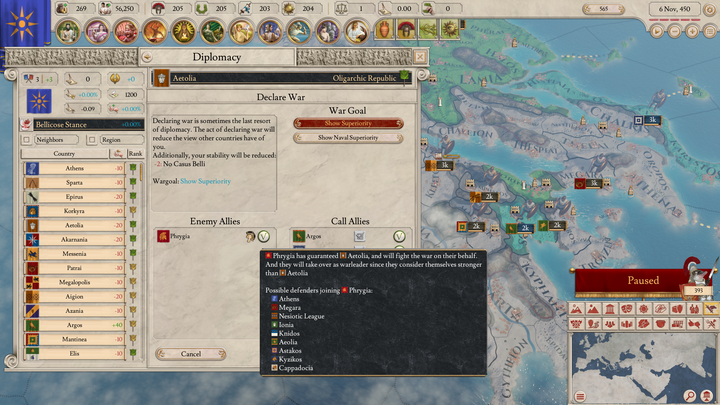
War leadership will now only transfer to an overlord when a subject is attacked, or from a guaranteed country when its strongest (most populous) protector is called. Once war leadership has transferred, the new warleader can call in their subjects and allies. 现在战争主导权只会在附庸国被攻击时转移到宗主国手中,或是在被保证独立国家的最强大保证者(人口最多的)被召唤时才会转移。在战争主导权发生转移后,新的战争领袖可以召唤其附庸和同盟国家。
While allies will still help out in wars they will never take over leadership of the war from you. 你的同盟国家仍然在为你而战并且不会夺取你的战争主导权。
Alliances & Guarantees 同盟和保障独立
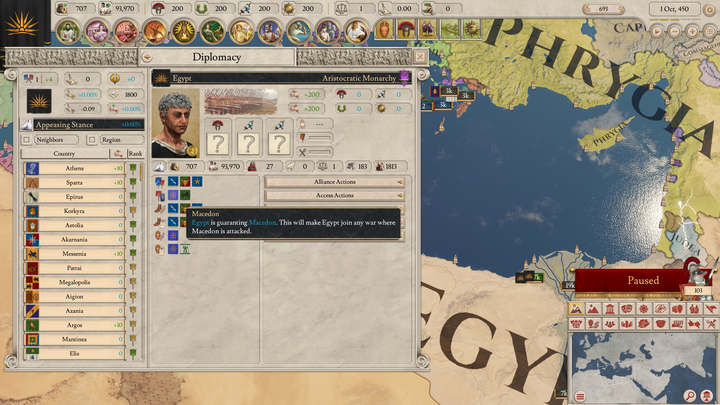
Alliances can now only exist between countries of the same rank and Great Powers can never have any allies at all (instead they will have to defend themselves and rely on guarantees or subject relationships to protect others). 同盟关系现在只能在同一国家等级的国家间缔结,而列强级别的国家无法拥有任何同盟(他们需要防御自身,但也可以依靠附庸关系与保障独立去保护其他国家)。
When your country changes rank through acquiring more cities, all existing alliances will be transformed into guarantees (there will also be a confirmation dialogue if demanding land in peace would result in a rank change). 当你的国家等级因为获取了更多城市发生变化以后,你现有的盟约都会转换成保障独立(如果你是通过和平索取得到土地导致等级变化的,此时还会有一段确认文本框)。
A guarantee is now no longer just a casus belli but will instead lead to a call to arms when the guaranteed country is attacked, and it now also costs 1 diplomatic relations slot. 现在的保障独立不仅是宣战借口了,取而代之的是当被保证国受到攻击时将可以被召唤加入战争,并且保障独立也会占据一个外交关系。
With these changes we hope to better reflect the drastically different types of relationship states could be in during this era, where a power may well act to defend, weaker states, but never as an equal (Rome itself is a good example of this type of diplomacy). With the possibility of more advanced cooperation between powers of more comparable strength. 我们希望这些改动可以更真实地反映那个时代该地区截然不同的国家关系,一个强权也许会会保护弱国,但不会视他们为对等的存在(罗马本身的外交历程就是一个好例子),在实力更加相当的情况下,大国间更高级的协定才可能会出现。
Country Ranks 国家等级
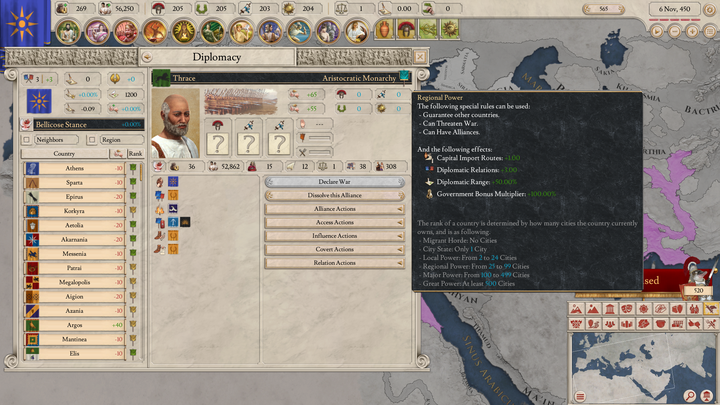
Allong with the changes to alliances we have changed the country rank definitions a bit. In particular we have increased the number of cities needed to be a Great Power (and therefore without allies) significantly, meaning there are no longer any Great Powers at the start of the game (though the Maurya Empire is close). 与同盟系统一道变动的,是我们稍微改变了一点国家等级的定义。我们尤其大幅增加了成为列强所需要的城市数量(成为列强就没有任何盟友了),这也意味着开局时没有任何国家是列强等级(尽管孔雀王朝Maurya Empire接近这个标准)。
Country Ranks:​
国家等级:
Migrant Horde: No Cities
迁徙部落:没有城市
City State: 1 City
城邦:拥有1座城市
Local Power: Between 2 and 24 cities.
地方强权:拥有2到24座城市
Regional Power: Between 25 and 99 Cities.
地区强权:拥有25到99座城市
Major Power: Between 100 and 499 Cities.
强权:拥有100到499座城市
Great Power: 500 or more Cities.
列强:拥有500座或更多的城市
India 印度
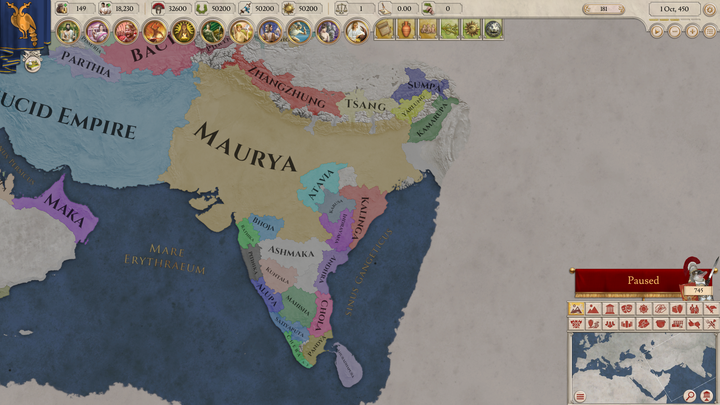
Today it is time to visit the subcontinent of India, separated from Persia and the Middle East by mountain ranges and deserts. This is also as far east as the map will go, it extends all the way to the Arakanese mountains and the natural border between India and Burma. India sticks out compared to all other regions we have been through in a number of ways, it is a region of vast fertile plains, high mountain ranges and deep jungles (a terrain type rarely found outside of India). India is also home to a very large part of the world population, even in 304 BCE, and the countries here generally have far larger resources than one might expect from their size. 今天我们将要访问印度次大陆,它是被山脉与沙漠阻隔而与波斯和中东隔绝的土地。这里也是本游戏地图的最东端了,它会一直延伸到阿拉干山脉和印缅的自然边界上。相比于我们浏览过的其他地区而言,印度非常有独特性,这是一片充满高大山脉与密林的地区(这种地形在印度外的其它地区非常罕见),即使是在公元前304年,印度也是世界上很大一部分人口的家园,这里的国家往往拥有远超出人们对其预期的资源规模。
Politically India has in history often been as diverse as Europe, with a number of different states fighting for hegemony, but at times it has also been united under great empires. Alexander the great, in his day, invaded even this region and conquered most of the Indus valley, leaving a number of Greek satraps and Greek settlements behind. In 304 BCE the subcontinent has however just watched the rise of the Maurya Empire under Chandragupta Maurya, who have risen from relative obscurity in the southern Indus Valley to defeating both the Nanda Empire, and the remaining Greek Satraps in India. 和欧洲一样,在历史上印度的政治是分裂的,各式各样数不清的国家为了霸权互相开战,但有时它也会被大帝国一统,比如亚历山大大帝在其鼎盛时期曾经入侵到这里,并且征服了印度河流域的大部分地区,留下了大量希腊总督与希腊人聚居地。在公元前304年,次大陆见证了孔雀帝国在旃陀罗笈多统治下的崛起,他在默默无闻中从印度河流域南部崛起,击败了难陀帝国与印度剩余的希腊总督们。
Religiously India at the start of our game is dominantly hindu but with Jainism and Buddhism both on the rise. Buddhism especially would come to spread from India in all directions, eventually becoming a major world religion. 印度地区开局时以印度教为主,但耆那教和佛教也都在发展。佛教会特别地从印度远传四方,最终发展为世界主要宗教之一。
In the last few diaries I have noted that there are numerous problems in finding sources and references for history of this era. India is far more well known than Germania or Scandinavia at our start, especially the part that was relevant to the Mauryas or the Greeks and their emissaries (some who visited the Mauryan capital in modern Bihar). India is also a very big place however, and there are still many parts of it that where we have had to extrapolate later day information. 在近期的几篇日志中,我提到过在查找该时代历史资料与参考文献的方面存在许多问题。我们对游戏开局时印度的理解,远比同时期的日耳曼尼亚或斯堪的纳维亚要深入,特别是孔雀王朝或希腊人及其使者(其中的有些人到访了位于今比哈尔邦的孔雀王朝首都)。然而印度也是一片极大的地区,而它仍有很多部分需要我们用比开局时间更晚的信息进行推断。
Indian Military Traditions 印度军事传统
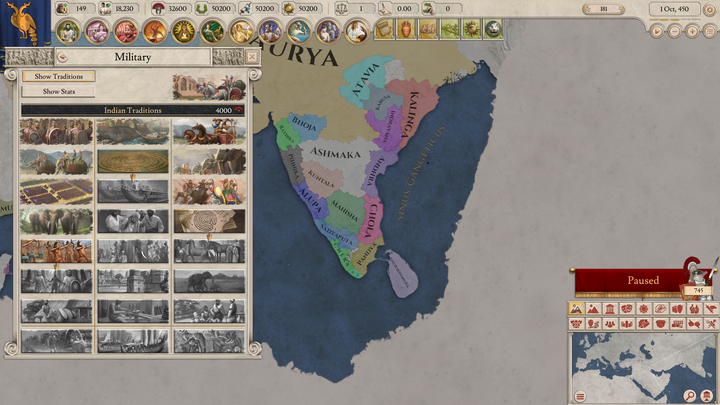
Starting Tradition - Rathas: Allows Chariots
初始传统–战车:允许组建战车。
(译注:Ratha在梵文中意为“战车”,现在也可以指做成神庙形状用于节日祭典的花车)
Maurya Path
孔雀王朝路线
Versatile Infantry: Archers Offense +15%
多面步兵:弓箭手攻击+15%
Descendants of Airavata: War Elephant Defense +15%
艾拉瓦塔后裔:战象防御+15%
(译注:艾拉瓦塔是印度神话中雷帝因陀罗的座骑,长着六只长牙的巨大白象。众神搅乳海创世之际,它从乳海中出生。传说太古时代的象能够飞行,但受到了诅咒因而不能再飞了。原本骑马的战神因陀罗改骑大象以后,标志着因陀罗开始了奢侈腐朽的享乐生活。)
Warhost of the Empire: Light Infantry Morale +10%
帝国战团:轻步兵士气+10%
Natural Pathfinders: War Elephant Jungle & Forest Combat Ability +15%
自然向导:战象在丛林和森林地形上作战能力+15%
Dedicated Archers: Archers Discipline +10%
忠诚弓兵:弓箭手训练+10%
Homeland of our Fathers: Heavy Infantry Forest & Jungle +15%, Light Infantry Forest & Jungle +15%
父辈家园:轻步兵和重步兵在森林&丛林地形上+15%作战能力
Integrating the Tribes: National Tribesman Happiness +20%
整合部落:全国部落民幸福度+20%
Finisher Bonus - The Bureaucracy of War: Monthly War Exhaustion -0.02
关门奖励–战争官僚:每月厌战-0.02
Coastal Path
沿海路线
Natural Harbors: Galley Cost -15%
天然港湾:桨帆船花费-15%
The Vyuha System: Archers Morale +10%
尤哈系统:弓箭手士气+10%(译注:Vyuha在梵文中意为“庄严”)
Masters of the Sea: Trireme Morale +10%
海洋大师:三列桨战舰士气+10%
Plunder!: Allows Raid Ports Ability, +20% Enslavement Efficiency
抢!:允许劫掠港口,+20%奴役效率
Flexible Divisions: Morale of Armies +10%
灵活编制:陆军士气+10%
City of the World's Desire: Fort Defence +15%
此世渴望之城:堡垒防御+15%
State Artisan: Archers & Chariot Cost -10%
国家匠人:弓兵&战车花费-10%
Finisher Bonus - The 'Diplomatic' Fleet: Trireme Discipline +10%
关门奖励–“外交”舰队:三列桨战舰训练+10%
Noble Path
贵族路线
Fit for a King: Chariot Defense +15%
遂我王意:战车防御+15%
Trained to Kill: War Elephant Discipline +10%
磨练技艺:战象训练+10%
Armored Archers: Archers Defense +15%
武装弓兵:弓箭手防御+15%
Padma Vyuha: Allows Padma Vyuha Tactic
庄严莲花:允许“莲花阵”战术(译注:Padma在梵文中意为“莲花”)
Imported Horses: Chariot Discipline +10%
进口马匹:战车训练+10%
Elephantine Abundance: War Elephant Cost -15%
充足象群:战象花费-15%
Exotic Soldiers: Mercenary Maintenance -15%
异国士兵:雇佣兵维护费-15%
Finisher Bonus - Striding Besides Giants: War Elephant Morale +10%
关门奖励–伴行巨人:战象士气+10%
Northern India 北印度
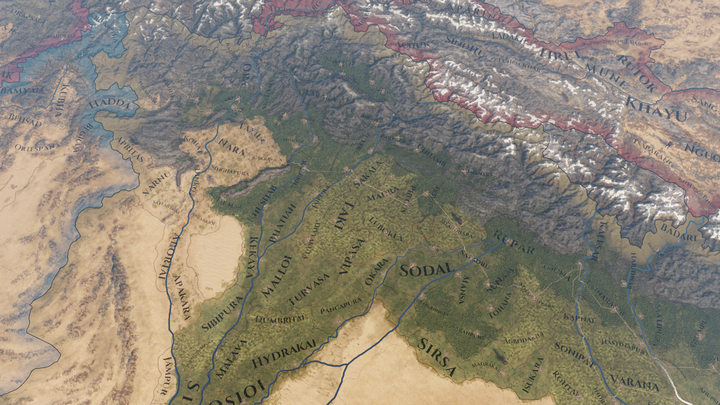 Indus Valley 印度河谷 Indus Valley 印度河谷
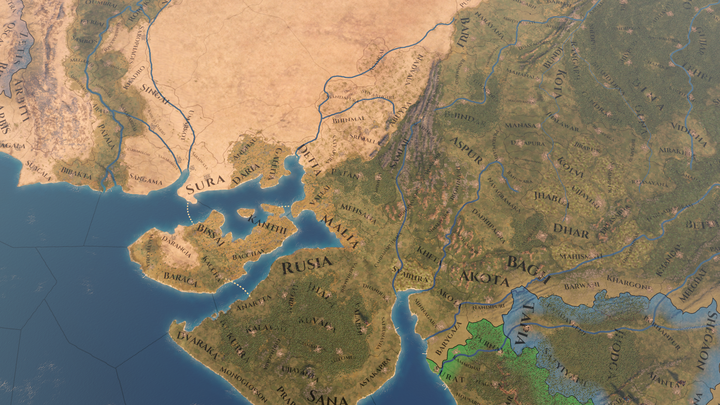 Western Coast, the Maru Desert and the Avanti region 西海岸,马茹沙漠与阿槃提地区 Western Coast, the Maru Desert and the Avanti region 西海岸,马茹沙漠与阿槃提地区
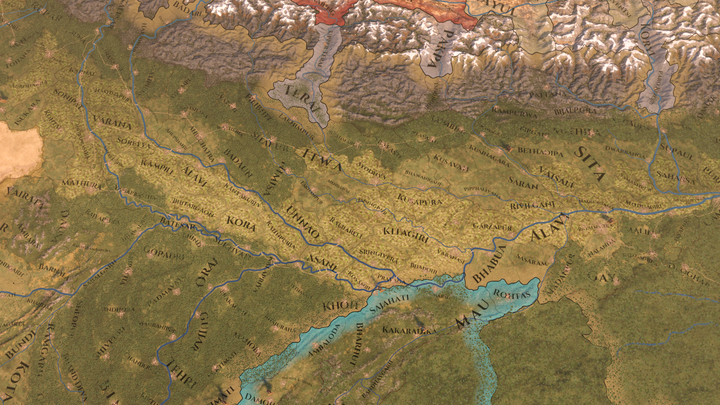 Gangetic Plain 恒河平原 Gangetic Plain 恒河平原
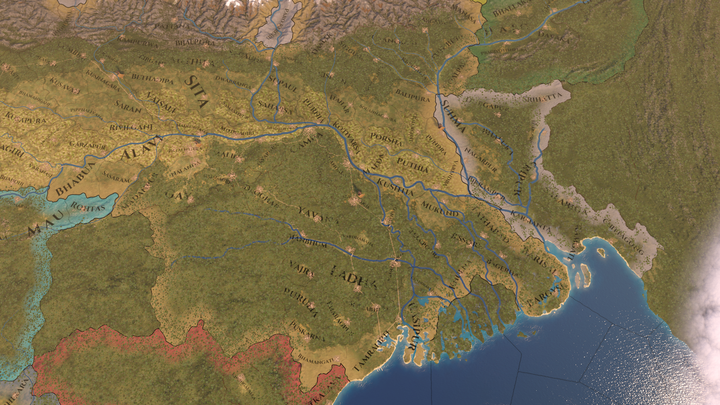 Bengal 孟加拉 Bengal 孟加拉
Northern India is dominated by the Indo-Gangetic Plain, much like the Nile delta this is a very densely populated and fertile part of the world. Unlike the Nile Delta however it is far greater in size. The plain itself has been the heartland of a number of empires throughout history and at our start it is dominated by the newly formed Maurya Empire, which has just recently established its capital in Pataliputra, in north eastern India. 印度北部以印度-恒河平原为主导,就如同尼罗河三角洲一样,这是一块世界范围内也算人口密集、土地肥沃的地区。但与尼罗河三角洲不同的是,其规模要大得多。这片平原一直是多个帝国的腹地,在游戏开局时它由新生的孔雀王朝主宰,它前不久才在印度东北部的巴特那Pataliputra(译注:中文典籍中称华氏城)建都。
The Indus region in the far west has for a period of time been under Greek rule, after having been conquered by Alexander the Great and then handed over to a number of successive Greek Satraps. It is now theoretically part of the Seleucid Empire, but in practice these satrapies are under Mauryan control. The Seleucid and Mauryan empires have been in continuous conflict for a number of years now, ever since Seleucus and his son Antiochus moved east to secure Bactria, and the eastern Persian Satrapies. 遥远西面的印度河流域在被亚历山大大帝征服后就一直处于希腊人统治之下,随后被交给了大量继任的希腊总督。理论上现在这里是塞琉古帝国的一部分,但实际上这些总督领都处于孔雀王朝控制下。自从塞琉古及其儿子安条克为了确保巴克特里亚和波斯东部总督领而东移以来,塞琉古帝国和孔雀王朝就陷入了持续多年的冲突。
As our game starts the Seleucid-Mauryan conflict is about to end, with the Seleucids handing over control over large parts of the eastern parts of their empire in return for a truce with the Indian conquerors and a great number of War Elephants to use in their wars with the other Greek Successors. 在我们的游戏开局时,塞琉古-孔雀王朝的冲突已经接近尾声,塞琉古将帝国东部的大片土地拱手相让,用以换取和印度征服者的休战,以及大量用于和其他希腊继业者作战的战象。
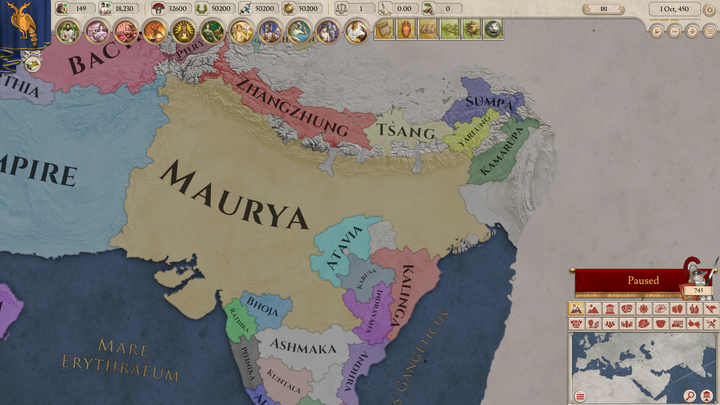
Starting Countries
初始国家
Maurya: In time the Maurya empire would come to unite almost the entire subcontinent, and be remembered as one of the more successful pan-indian Empires. In 304 BCE however this is a very young kingdom, not unlike the big Diadoch monarchies in the west. The ruler, Chandragupta Maurya, would in time build a state different from previous ones in this region. It is hard to overstate the influence of the Maurya empire, not just because of the amount of land it came to include but also due to the conversion and missionary work of Ashoka for the Buddhist faith.
孔雀王朝:孔雀王朝最终将统合几乎整个次大陆,并将作为更加成功的泛印度帝国而为人铭记。然而在公元前304年时,相比于西方的诸继业者们它还只是一个非常年轻的王国。其统治者旃陀罗笈多·孔雀,最终将建立一个在该地区前所未有的国家。孔雀王朝的影响力无论怎么夸张都不为过,不仅因为它将要吞下的大量土地,还因为阿育王改信佛教及其传教工作。
Atavia: Not all parts of the Maurya empire is ruled directly by Chandragupta’s governors. The tribal forest regions were generally kept in a more loose relationship as a subject state. Atavia is a settled tribe (previously known as a Tribal Kingdom), and starts as a Tributary of Maurya.
阿塔维亚:并不是孔雀王朝的所有土地都由旃陀罗笈多的政府直接统治。部落控制的森林地区依然凭松散的关系作为一个附属国家存在。阿塔维亚是一个定居部落(以前称为部落王国),开局时是孔雀王朝的朝贡国。
Kamarupa: In the far east, in the jungles of the Brahmaputra alley, the tribal state of Kamarupa remains independent from the Maurya empire.
迦摩缕波:在遥远的东方雅鲁藏布江的丛林中,部落国家卡玛鲁帕依然独立于孔雀王朝。
Kalinga: Independent kingdom in modern Orissa. Kalinga famously resisted Maurya rule until it fell to Ashoka in a very bloody and savage military campaign. So much so that Ashoka is said to have sworn forsworn excessive violence and embracing Buddhism.
羯陵伽:位于现今奥里萨的独立王国。羯陵伽以其对抗孔雀王朝的统治而闻名,直到阿育王通过一场血腥而野蛮的军事行动将其征服。传说阿育王正是因此发誓放弃滥用暴力,并皈依佛教。
Karusa: Tribal state in the jungles of Eastern India. Not much is known about this region at the start of the game in history.
卡鲁萨:印度东部丛林中的部落国家。我们对游戏开局时的该地区知之甚少。
Indravana: Another tribal states in the hilly jungles of modern Orissa and Chattisgarh.
印德拉瓦纳:位于今奥里萨与恰蒂斯加尔丘陵丛林中的另一部落国家。
Bhoja: Tribal state in the Nimar valley, western India.
波阇:印度西部尼玛河谷的部落国家。
Rathika: Tribal state on the north western coast of India. Right on the border of the Maurya empire.
拉希卡:印度西北海岸的部落国家,与孔雀王朝接壤。
Southern India 南印度
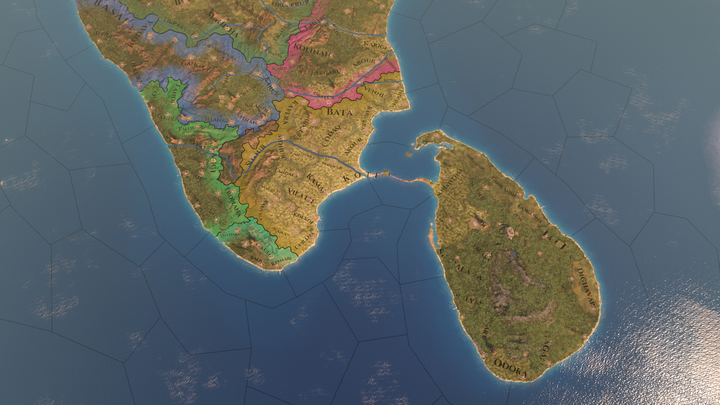 Southern Tip of India, Sri Lanka and the Tamil Country 印度南端,包括斯里兰卡与泰米尔人国家 Southern Tip of India, Sri Lanka and the Tamil Country 印度南端,包括斯里兰卡与泰米尔人国家
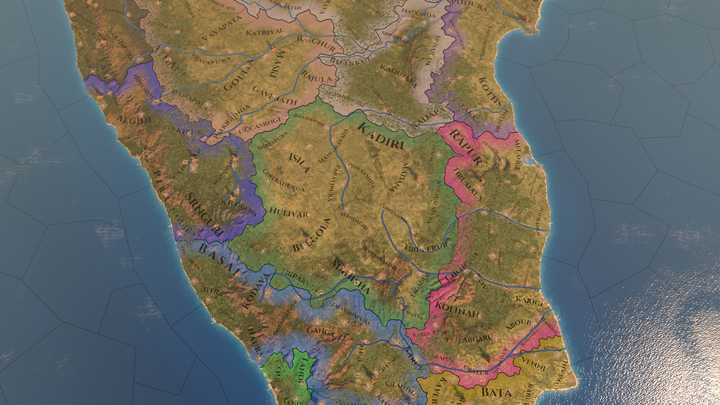 Central India 中央印度 Central India 中央印度
While most states in the south are not as well documented as northern India the Indian ocean ports here would become known to Roman and Greek traders, this region is also home to some of the oldest dynasties in the history of India, such as the Pandya's, Cholas and Cheras. 尽管印度南部的诸多国家并不如北部记录详尽,但该地的印度海港将在日后备受罗马与希腊贸易者青睐。该地区也是印度历史上许多王朝的祖地,例如潘德亚王朝Pandya's、朱罗王朝Cholas与哲罗王朝Cheras。
Especially the island of Sri Lanka and the Tamil country in the far south west are very populous regions however and while not as strong as the Maurya empire in the north they are owned by powers with the potential to grow their influence in 304 BCE. 尤其是斯里兰卡岛与西南端的泰米尔人国家都是人口密集的地区,尽管其没有北面的孔雀帝国一样的实力,但在公元前304年的此地诸国仍是具有发展潜力的政权。
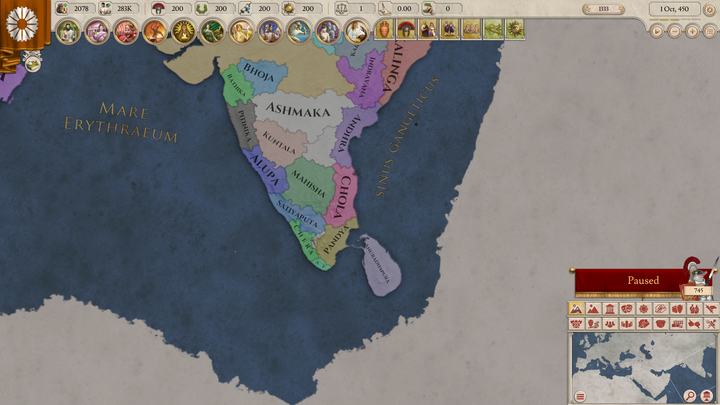
Starting Countries:
初始国家:
Ashmaka: Weak Tribal State in the dry Deccani upland, just south of the Maurya border. Would be conquered by the successors of Chandragupta, who would also extend the road network south through this region.
阿湿波:位于德干高地的弱小部落王国,紧邻孔雀帝国南部。将来会被旃陀罗笈多的诸多后继者征服,将道路系统拓展至南部地区的也正是后继者们。
Pitnika: Coastal kingdom controlling parts of the Western Ghats and the Konkan coastline.
皮特尼喀:控制着部分西部西高止山脉与康坎海岸线的沿海王国。
Kuntala: Tribal state in the central South Indian upland, eventually conquered by the Mauryas.
昆塔拉:中南印度高地的部落制国家,将来会被孔雀王朝所征服。
Andhra: The tribal Andhra state centered on the Krishna river rule parts of the eastern Indian coastline, a region that still bears their name.
安得拉:部落制的安得拉位于克里希纳河并统治着东海岸一部分,现今一个邦仍沿用此名。
Mahisha: Tribal state of which we know very little in the South Indian interior plateau. Conquered by the Maurya empire within a generation of our start.
马希莎:在印度南部高原内陆且知之甚少的部落制国家。在开局一代内便被孔雀王朝征服
Alupa: Long lived Tribal State on the coast of Karnataka, ruled by the Alupa Dynasty. Would in time survive many of the great empires of India, including the Mauryas, far into the middle ages.
阿那帕:一个位于卡纳塔克海岸延续许久的部落制王国,由阿那帕王朝所统治。史实中会见证许多印度的帝国起落,包括孔雀王朝,甚至会残存至中世纪。
Satiyaputa: Tribal state in the Mysore plateau and the western Ghats.
百乘王朝:位于迈索尔平原与西部山脉的部落制国家。
Chera: One of the most important kingdoms of the far south, the Chera control a number of the Indian Ocean trade ports, that would remain commercial entrepots up until present day.
哲罗王朝:南端最重要的王国之一,哲罗控制着一部分印度贸易海港,它们直至今日仍是转口贸易的重地。
Ay: Small kingdom on the tip of the Indian subcontinent, in modern Kerala. The Ay dynasty, is one of the oldest known lineages of its region.
阿依:印度次大陆南部顶角的小王国,位于现今喀拉拉邦。阿依王朝是现今该地区最古老的已知血脉之一。
Chola: Autocratic Monarchy on the eastern coast of southern india (later known as Coromandel, a name based on what they called their realm). The Cholas would historically create their own overseas empire but at our start they are just a local power in this region.
朱罗:印度南部东海岸的独裁君主政权(后日名为科罗曼德,基于他们自称其国度的名字)。朱罗王朝历史上会建立他们自己的海外帝国,但在游戏开局是时他们仅是该地区的一个地方政权。
Pandya: Autocratic Monarchy in the rich Tamil country ruled by a dynasty that considers itself already quite ancient by 304 BCE (and in fact they are also playable both in Europa Universalis 4 and Crusader Kings 2).
潘德亚:位于富有的泰米尔人的独裁君主政权,由一个自认在公元前304就已经足够古老的王朝统治。(事实上他们在欧陆风云4和十字军之王2里都能选择游玩)
Anuradhapura: Kingdom ruling the island of Sri Lanka at our start, based around the great city of Anarudhapura. The kingdom would in time become greatly influenced by the spread of the Buddhist faith, an influence that remains to this day.
阿努拉德普勒:(译注:又作阿努拉达普拉)在游戏开局时统治着斯里兰卡岛的王国,以其伟大的阿努拉德普勒城为中心。这个王国日后会受佛教传播的深度影响,直至今日仍可见一斑。
翻译:维尔沃德 子炎君 zzztotoso 校对:万豪顿 三等文官猹中堂
|